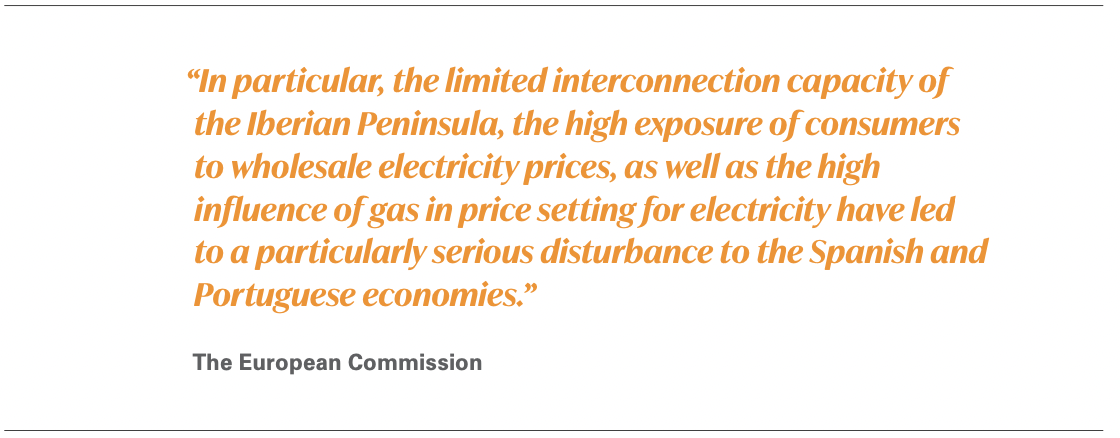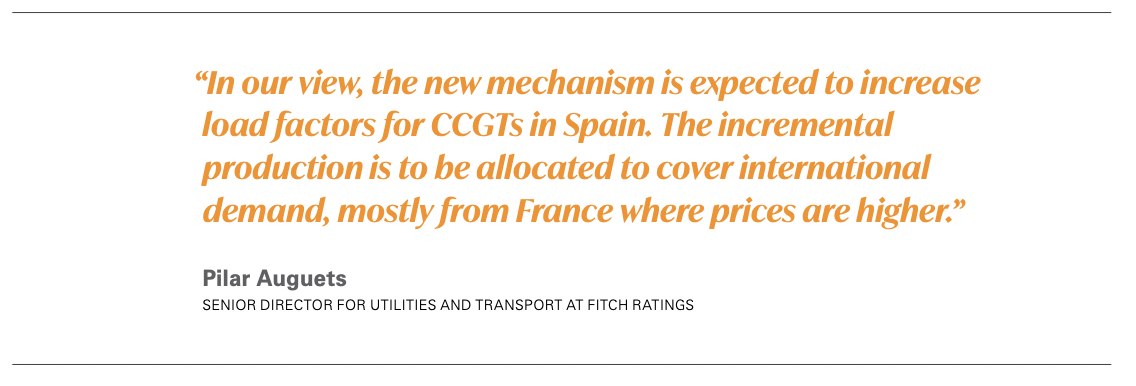EU nations pursue price caps amid surging energy costs [Gas In Transition]
After speaking out against energy price caps for several years, the energy crisis caused by Russia’s invasion of Ukraine has prompted the European Commission to think differently, at least for the time being. In early June, Brussels approved, under EU state aid rules, Spain and Portugal’s temporary implementation of price caps on gas purchased by power generators. Gas is the price setting fuel in Spain and the thinking is that capping the price of gas for power generators will lower prices on the Iberian electricity market where prices have been soaring since the start of the war.

The Iberian price caps will apply until May 31, 2023. Subsidy payments to power plant operators will be calculated based on the price difference between the market price of natural gas and the gas price cap. The price cap will be set at €40 ($42)/MWh during the first six months, increasing by €5/month thereafter to €70/MWh in the twelfth month. By comparison, day-ahead gas prices on the MIBGAS gas market traded above €105/MWh as of June 15. Day-ahead power prices settled at above €170/MWh on the same day.
The subsidy scheme will cost Spain €6.3bn and Portugal €2.1bn. It will be financed by the “congestion income” obtained by the Spanish grid operator Red Electrica de Espana (REE) as a result of cross-border electricity trade between France and Spain, and by charging buyers benefitting from the subsidy measure.
The EC said it approved the measure because EU competition law, article 107 under the EU Treaty, allows Member States to grant aid to companies or sectors to remedy a serious disturbance in the economy.
“In particular, the limited interconnection capacity of the Iberian Peninsula, the high exposure of consumers to wholesale electricity prices, as well as the high influence of gas in price setting for electricity have led to a particularly serious disturbance to the Spanish and Portuguese economies,” the EC said.It added that the scheme does not go beyond what is necessary to address exceptionally high electricity prices and that it is temporary.
The electricity mix in Spain is dominated by renewables, gas, nuclear and hydro power. From January to May this year, CCGTs accounted for around 19% of power generation in Spain while co-generation accounted for 9% and coal less than 3%, according to data from REE. Solar and wind power accounted for about 34% of generation, nuclear power and hydro about 21% and 8% respectively.
One uncertainty is whether gas-fired power will actually increase given that gas purchases are now subsidised.
Pilar Auguets, senior director for utilities and transport at Fitch Ratings, tells NGW the support scheme could increase the utilisation of CCGTs in Spain and that Spain could become a net exporter of electricity to France via the 2.8-GW interconnectors between the two nations.
“In our view, the new mechanism is expected to increase load factors for CCGTs in Spain. The incremental production is to be allocated to cover international demand, mostly from France where prices are higher,” says Auguets. “We expect that as long as the measure remains in place, initially set until June 2023, Spain could become a net exporter. However, the impact is limited to the interconnection capacity between the two countries.”
“As for additional implications, we see the increase in carbon emissions due to higher CCGT production but this should be net off coal production being pushed out of the merit order,” she says.
On the first day of the scheme’s implementation, on June 15, wholesale power prices were expected to fall materially, by 15% according to one estimate, while in the end strong demand for air conditioning due to the heatwave meant that prices only fell by around 6%.
Others question whether the scheme will really only last until May/June next year. One regulatory source tells NGW that the Spanish general elections are by many expected to take place as late as end-2023 and that this could prolong the measure.

“That can be a factor in the decision. If the measure is working, the government, as far as I understand, would request its extension,” the source says.
There was a good reason to believe that the elections would be on hold until late 2023 as Spain will hold the rotating Presidency of the EU Council in the second half of that year “and the current Spanish president won’t risk missing that,” says the source.
Several nations plan market intervention
Spain is not the only EU country introducing regulated prices. Greece, for example, has announced plans to introduce temporary measures to disconnect electricity and gas prices. Moreover, in March this year, Greek prime minister Kyriakos Mitsotakis wrote a letter to EC president Urslua von der Leyen proposing a Six-Point plan for tackling high gas prices. This included a TTF price cap, based on the highest historical gas price before the invasion of Ukraine, a fluctuation band on TTF prices to limit volatility and profit margin caps in electricity markets.
“By intervening in the market in this respect, our Union can protect its members by pausing the “weaponization” of natural gas against our economies and decoupling the geopolitical crisis from the energy crisis, without affecting production and supply of natural gas in the short term,” the letter said.
Brussels has supported the liberalisation of wholesale gas and power markets over the years with the aim of developing liquid and competitive markets and with price signals that reflect supply and demand. Although plenty of work remains to be done, liquidity and competition has improved in many markets over the years owing in part to EU legislation such as the Third Energy Package, Network Codes and transparency initiatives under the Regulation on Wholesale Energy Market Integrity and Transparency (REMIT). This begs the question if regulatory intervention will represent a step backwards in the liberalisation process. For example, will market participants lose trust in markets that are prone to intervention such as price caps, even if these measures are temporary?
With power and gas prices expected to stay high in the foreseeable future, pressure on governments to intervene in markets will not go away.
“Realistically, we will remain in a high price environment for this year. The Commission has pointed to several options Member States can use to effectively mitigate the impact of prices– from taxing windfall profits to extending the use of regulated prices,” the EU’s energy commissioner Kadri Simson said in a speech on 14 June, according to a transcript.
“We have cleared the mechanism introduced from Spain and Portugal to subsidise the input cost of marginal electricity generators. We will be examining other national schemes.”
Simson said the EC would launch an impact assessment and consultation on the functioning of the European electricity market, including the effect of gas prices on it.
The Agency for the Cooperation of Energy Regulators (ACER) noted in a recent report, an assessment of the European wholesale power market, that gas prices were the root cause of high electricity prices. Putting downward pressure on gas prices, for example through energy savings and boosting supply to Europe, would ostensibly also bring down electricity prices.
“ACER cautions to consider prudently the need for interventions in electricity market functioning in the current circumstances, and if pursued for policymakers to tackle the root cause of the problem (currently gas prices) rather than the electricity market framework itself,” ACER said.



